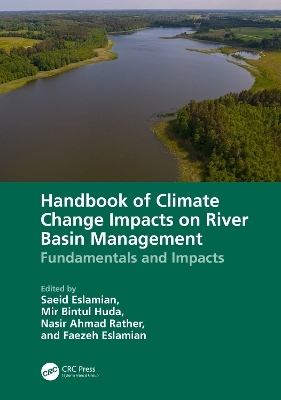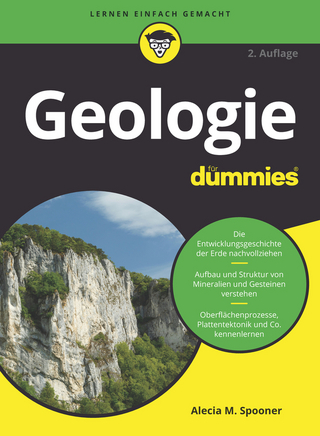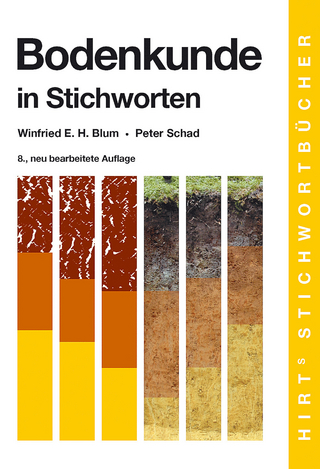
Handbook of Climate Change Impacts on River Basin Management
CRC Press (Verlag)
978-1-032-04179-7 (ISBN)
One of the results of climate change has been the impact on the sediment yield and its transport. These changes have implications for various other environmental components, particularly soils, water bodies, water quality, land productivity, sedimentation processes, glacier dynamics, and risk management strategies to name a few.
This volume provides an overview of the fundamental processes and impacts of climate change on river basin management and examines issues related to soil erosion, sedimentation, and contaminants, as well as rainfall-runoff modeling and flood mitigation strategies. It also includes coverage of climate change fundamentals as well as chapters on related global treaties and policies.
Prof. Saeid Eslamian is a full professor of environmental hydrology and water resources engineering in the Department of Water Engineering at Isfahan University of Technology, where he has been since 1995. His research focuses mainly on statistical and environmental hydrology in a changing climate. In recent years, he has worked on modeling natural hazards, including floods, severe storms, wind, drought, pollution, water reuses, sustainable development and resiliency, etc. Formerly, he was a visiting professor at Princeton University, New Jersey, and the University of ETH Zurich, Switzerland. On the research side, he started a research partnership in 2014 with McGill University, Canada. He has contributed to more than 600 publications in journals, books, and technical reports. He is the founder and chief editor of both the International Journal of Hydrology Science and Technology (IJHST). Eslamian is now associate editor of three important publications: Journal of Hydrology, Eco-Hydrology and Hydrobiology, Journal of Water Reuse and Desalination (IWA) and Journal of the Saudi Society of Agricultural Sciences. Professor Eslamian is the author of more than 40 books and 200 chapter books. Dr. Mir Bintul Huda (B.Tech, M.Tech, AMIE, Ph.D.) is presently a Consultant at Water Resources Management Centre, National Institute of Technology Srinagar, Jammu & Kashmir. Her work is on Water Resources, Climate Change Impacts and adaptation of strategies with respect to Planning and Management of Water Resources Systems of Indus Basin. Dr. Mir received Ministry of Human Resources Development (MHRD) Doctoral fellowship from Government of India and earned her Doctorate in Civil Engineering with majors in Water Resources Engineering from National Institute of Technology Srinagar. She did her Masters of Technology in Water Resources Engineering from NIT Srinagar. She has done her Bachelors in Agricultural Engineering from Sher-e-Kashmir University of Agricultural Sciences and Technology, Kashmir (SKUAST-K). She is a Corporate Member of Institute of Engineers, India, Kolkata (IEI) and earned her AMIE in Civil Engineering. Her research interests comprise of Water Resources Engineering, Management and Hydraulic Structures. In addition to handling the project work she is actively involved in supervising Doctoral and Post-Graduate candidates in their R&D activities. She has many publications in reputed international journals to her credit and is associated with several academic societies. Dr. Nasir Ahmad Rather (B.E., M.Tech, Ph.D.) is an Assistant Professor of Civil Engineering at College of Engineering and Technology, Baba Ghulam Shah Badshah University, Rajouri, Jammu & Kashmir, India. In addition to conducting classes for the engineering students, he is actively involved in guiding the research projects. He is also part of many academic committees and administrative boards. Dr. Rather has Doctorate in Civil Engineering from National Institute of Technology Srinagar, Masters of Technology (M. Tech) in Water Resources Engineering from the National Institute of Technology Srinagar and Bachelors of Engineering (B.E.) in Civil Engineering from University of Kashmir, India. He received Ministry of Human Resources Development (MHRD) Doctoral Fellowship from Government of India. His research interests include Water Resources and Geo-technical Engineering, Protective Filters, Climate Change, Hydraulic Structures and River Engineering. He has numerous publications in international peer-reviewed journals of high impact. Dr. Rather is actively associated with different national and international societies and academies and gained recognition among the honorable subject experts with the contributions made. Dr. Faezeh Eslamian is a PhD Holder of Bioresources Engineering in McGill University. Her research focuses on the development of a novel lime-based product to mitigate phosphorus loss from agricultural fields. Faezeh completed her bachelor and master’s degrees in Civil and Environmental Engineering from Isfahan University of Technology, Iran where she evaluated natural and low-cost absorbents for the removal of pollutants such as textile dyes and heavy metals. Furthermore, she has conducted research on the worldwide water quality standards and wastewater reuse guidelines. Faezeh is an experienced multidisciplinary researcher with interest in soil and water quality, environmental remediation, water reuse and drought management.
Part I: Soil Erosion, Sedimentation and Contaminants. 1. Sediment Impact on Flood-Spreading Projects. 2. Soil Erosion and Sediment Yield Modeling. 3. Sediment Transport in Urban Drainage Channels. 4. Effect of Contaminants in Irrigation Water on Soil and Groundwater Pollution. 5. Sediment Pollution and Global Warming. Part II: Rainfall-Runoff Modeling and Risk Management. 6. Hydrological Simulation of Rainfall-Runoff Modeling Based on ANFIS. 7. Runoff: Computation and Modeling. 8. A Review of Flood Risk Management Methods. Part III: Climate, Water and Society Interaction. 9. Climate and Society Interaction in Urban Watersheds. 10. Effect of Social Activities on Water Management with Emphasis On Water Users’ Cooperatives. Part IV: Climate Change Fundamentals. 11. Global Treaties and Policies on Climate Change and Water Resources. 12. Global Climate Change Vulnerabilities and Adaptation Scenarios. 13. Global Climate Modeling and Regional Climate Downscaling. 14. Dynamics of Watershed Processes in Light of Climate Change. 15. Sediment Yield and Discharge in the Changing Climatic Scenario. 16. Glacier Change, Glacial Lake Outburst Flood and Sediments in Changing Climate. Part V: Climate Change Impacts. 17. Introduction to Climate Change Impact on River Basin Management. 18. Impact of Changing Climate on the Streamflow. 19. A Global Perspective on Negative Impacts of Climate Change on Soil Erosion. 20. Impact of Climate Change on Sediment Load and Sediment Yield in Drainage Basins. 21. Impact of Changing Climate on the Land Use and Land Cover: An Overview. 22. Impact of Changing Climate on Land Use and Land Cover: A Comprehensive Review. 23. Impacts of Climate Change on Water and Food Security in River Basins: Need for Climate Smart Agriculture. 24. Impacts of Climate Change on the Quantity and Quality of Surface Water Resources.
| Erscheinungsdatum | 02.08.2024 |
|---|---|
| Zusatzinfo | 49 Tables, black and white; 54 Line drawings, black and white; 16 Halftones, black and white; 70 Illustrations, black and white |
| Verlagsort | London |
| Sprache | englisch |
| Maße | 178 x 254 mm |
| Gewicht | 884 g |
| Themenwelt | Naturwissenschaften ► Geowissenschaften ► Geologie |
| Naturwissenschaften ► Geowissenschaften ► Hydrologie / Ozeanografie | |
| Technik ► Bauwesen | |
| Technik ► Umwelttechnik / Biotechnologie | |
| ISBN-10 | 1-032-04179-X / 103204179X |
| ISBN-13 | 978-1-032-04179-7 / 9781032041797 |
| Zustand | Neuware |
| Informationen gemäß Produktsicherheitsverordnung (GPSR) | |
| Haben Sie eine Frage zum Produkt? |
aus dem Bereich


